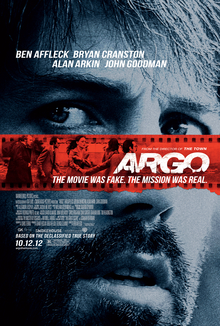
Let's not bury the lede: Argo is a terrific, airtight political thriller, and a work of cinematic craftsmanship that will likely be among this year's best-of discussions. That is all you need to know before going to see it, and I advise you to do so knowing as little as possible about Argo other than it's a tremendous picture.
Argo is also hilariously funny, ranging from darkly comic to laugh-out-loud, and none of it subtracting from Argo's intensity when the time comes to get serious. It's a movie for grown-ups who may want to take a short hiatus from superhero pictures and animated flicks about sassy talking animals—challenging without being alienating, rarely over-explaining unless it is absolutely necessary, and about grown-ups dealing with grown-up issues in grown-up ways. That is also all you need to know before going to see it, so please, for pity's sake, go and see the movie and then come back and read this review. I went into Argo popsicle-cold and loved the hell out of it, and part of my enjoyment stemmed from the surprise in where the movie headed. Go see it. Now.
Seriously, go. I'll be here when you get back.
…
Alright, hopefully you're just returning from a matinee of Argo and are ready for this spoiler-filled discussion.
Here's the secret that made Argo so much fun to watch unfold: Argo is a film about how six American hostages escape from the Iranian hostage crisis by posing as a film crew scouting for a shitty-looking Star Wars ripoff. Imagine if Seal Team Six gained access to the Bin Laden compound by claiming they were in a damn Ed Wood picture and you're part of the way there. Once you realize that this most serious of problems is being solved by such an unorthodox plan, Argo turns into a joyride of subverted expectations and familiar thrills, especially because Argo does such a good job of establishing the stakes of what will happen if the operation fails.
Argo follows Tony Mendez (Ben Affleck), C.I.A. extraction specialist who is called in to consult on rescuing six American embassy workers who are holed up in the Canadian ambassador's house. Mendez and his boss (Brian Cranston) are stuck until Mendez is hit with an idea while watching Rise of the Planet of the Apes with his ten-year-old son (Aidan Sussman): pretend the hostages are location-scouting for a science-fiction movie and fly them out through the airport. This includes hiring make-up artist John Chambers (John Goodman) and director Ken Taylor (Alan Arkin) as consultants to help produce the fake movie, and cooperating with the Canadian ambassador (Victor Garber).
My favorite thing about Argo is how, deep down, it's a heist movie in disguise. Just as Inception was a heist picture disguised as mind-screw science fiction, so, too, is Argo a heist picture disguised as a period political thriller, operating under many of the genre's rules even as it doesn't adhere to them all the way. Consider: our protagonist (Mendez) needs to assemble a team (O'Donnell, Chambers, Siegel, etc.) in order to infiltrate an impenetrable zone (Iran) and walk out with valuable cArgo in-hand (six American hostages), after which they formulate a plan (pose as a crew scouting for a movie) and execute said plan, dealing with any unexpected snags along the way. It's The Italian Job, except substitute gold bullion for sympathetic human beings.
What fascinates me about Argo is how disparate the tone ranges during its scant two-hour runtime. It boils down to juxtaposition and balance between the darkly comic, nail-biting tension, and just enough belly chuckles. Consider the first scene showing a rioting crowd outside of the US Embassy, burning American flags and chanting angrily. Inside the embassy, a desk worker peeps under the blinds and idly remarks how it seems like there were more of them yesterday, relieving the pressure before it buckled under its own weight and setting up a precedent for subverting viewing expectation.
In fact, Argo's chief appeal, other than watching Mendez and his team narrowly avoiding all kinds of mortal peril, is how it consistently subverts itself. The very first image in Argo is the Warner Bros. logo, the 1970's one with three dots that shape a "W," while splotches of damage to the movie's negatives mark up the edges. Wait, negative damage, in a digital theater? And while Argo doesn't carry the ruse the whole time à la Grindhouse, it keeps the viewer off-guard through such an atypical opening, a feeling exacerbated by a short Iranian history lesson conveyed through a mixture of archival news footage and film storyboards. Yes, film storyboards.
The only way a film with as many spinning emotional plates as Argo could work is with phenomenally canny editing, and William Goldenberg performs admirably, balancing Argo's most stressful and light moments. Goldenberg's editing is primarily responsible for Argo's best scene, which crosscuts between treatment of Iranian political prisoners and an in-costume Argo table read, juxtaposing the fake glamorous Hollywood veneer with the real-world political climate and somehow not feeling incredibly inappropriate. Goldenberg's work on Argo ought to be crowning work in a prestigious caree—wait, this guy cut Transformers: Dark of the Moon and Kangaroo Jack? Cripes, I guess some days you got it and some days you don’t.
Three times makes tradition, and Argo has Affleck scoring a solid hat trick of critically-praised movies for grown-ups, after 2007's Gone Baby Gone and 2010's The Town. Affleck wears many hats during Argo, directing tense scenes where the six American hostages are hiding in broad daylight among scads of murderous rioters shot like any modern political thriller, and short humorous breaks on Hollywood acting like Hollywood, complete with '70s-looking camera movements and shot composition. During the last half hour, Affleck goes for broke and ratchets down the tension, reminiscent of Spielberg's work on Munich, and reminding me how few quality thrillers are released today. For his tonal juggling act, I would love to see Affleck given a Best Direction nomination.
The only parts that give me pause are the small army of interim scenes where we visit the Canadian embassy and endlessly watch the sequestered six pace about and worry about how they will likely die rather than evacuate. Eventually, Mendez joins the rest of the crew and kicks the plot into high gear, but the first 45 of Argo's fleet-footed 120 minutes are much rockier than the proceeding 75.
Argo is a perfect October film, low-key enough for the mid-fall season while stoking enough interest for awards attention. Also, in this day of tenuous relations in the Middle East, it's nice to have a reminder that US Foreign Policy has been much worse. Argo is my surprise film of the fall, and I'm excited to see where the conversation around it leads come Oscar season.
